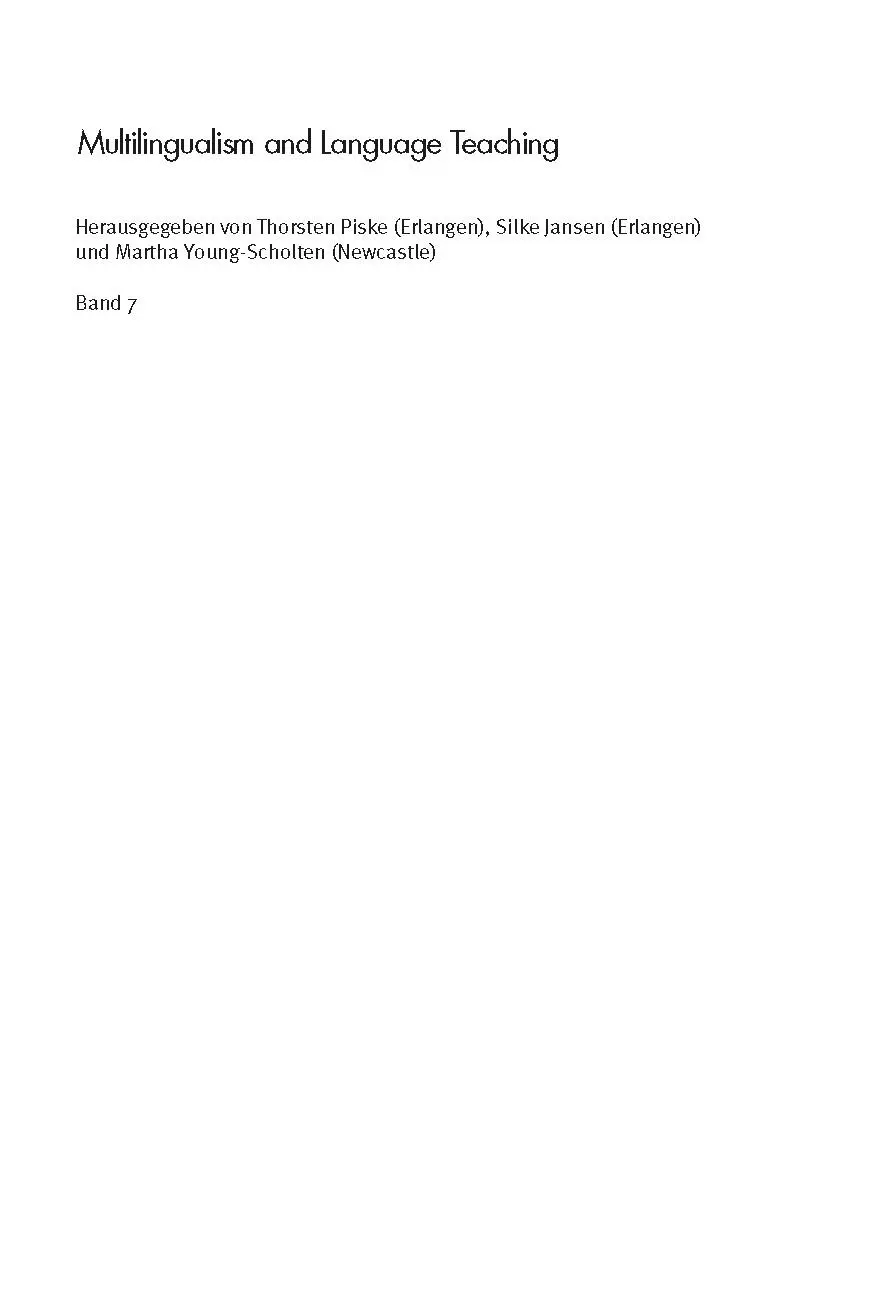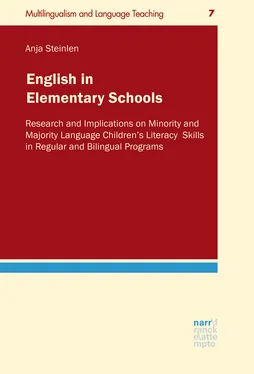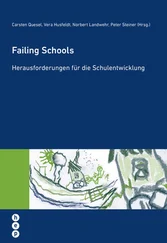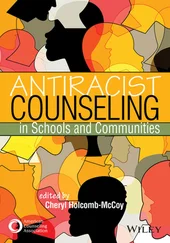
Anja Steinlen
English in Elementary Schools
Research and Implications on Minority and Majority Language Children’s Literacy Skills in Regular and Bilingual Programs
Narr Francke Attempto Verlag Tübingen
[bad img format]
© 2020 • Narr Francke Attempto Verlag GmbH + Co. KG
Dischingerweg 5 • D-72070 Tübingen
www.narr.de• info@narr.de
Das Werk einschließlich aller seiner Teile ist urheberrechtlich geschützt. Jede Verwertung außerhalb der engen Grenzen des Urheberrechtsgesetzes ist ohne Zustimmung des Verlages unzulässig und strafbar. Das gilt insbesondere für Vervielfältigungen, Übersetzungen, Mikroverfilmungen und die Einspeicherung und Verarbeitung in elektronischen Systemen.
ISBN 978-3-8233-8451-9 (Print)
ISBN 978-3-8233-0252-0 (ePub)
I would like to acknowledge a debt of gratitude to a great number of friends, family and colleagues who made it possible for this work to be carried out and who did not cease to offer their encouragement and support.
First, I would like to thank the committee members Thorsten Piske, Thomas Herbst, Eva Breindl (Friedrich-Alexander-University Erlangen-Nürnberg) as well as Jens Möller (Christian-Albrechts-University Kiel) and Angela Hahn (Ludwig-Maximilians-University Munich) for evaluating my work.
Although I claim as my own any deficiencies of this study, much of what it contains of value must be credited to Thorsten Piske. It has been a great pleasure to work with you over these many years. I would like to thank you for your friendship, your support and encouragement, your critical questions, your constructive feedback, and for countless stimulating and inspiring discussions.
I would also like to thank Jens Möller (CAU Kiel) who has been with this project from its very beginning to the very end. His team has always been very helpful, and I am particularly grateful to Anna Zaunbauer and Johanna Fleckenstein for many valuable discussions (about this topic and much more).
Andrea Abele-Brehm was my mentor in the ARIADNE mentoring program at FAU Erlangen-Nürnberg (2013-2015). Thank you for the right words at the right time and your advice regarding my first regression analyses.
This project would not have taken place without the three elementary schools, namely the Muhlius Schule in Kiel (Ulrike Gerdes and Henning Roose) and the Platanus Schule Berlin (Dr. Karin Krüger and Zoia Grüning). In the Hügelschule in Tübingen (Eva Herzog and Jutta Friesch), we have been able to conduct tests annually since 2012: thank you so much for your ongoing support and patience! In particular, I would like to express my gratitude to the teachers of the three schools who tirelessly strive for supporting the children in their classes! You make this world a better place!
After the tests had been carried out, the research assistants (Lea Pöschik, Jessica Schmidt, Anna Schrötter, and Johannes Schürmann, to name just a few) at Thorsten Piske’s Department for Foreign Language Education (Friedrich-Alexander-University Erlangen-Nürnberg, Germany) always made sure that the data was ready for further analyses. I would have not been able to process these large amounts of data without you. Thank you!
A good number of people also contributed substantially to the end product of this research: Nina Rogotzki has been my never-tiring proofreader for many years, and there is hardly any manuscript that did not go through her hands (or eyes) – thank you for many insightful comments on style and logic, and thank you for being my partner in crime on various trips to South America (and elsewhere).
Henning Wode (CAU Kiel) was the first source of inspiration, as he was the one who directed my attention to bilingual school programs. In 1995 I set foot in a bilingual elementary school for the first time and helped with collecting data on the infamous “Frog” story. Thank you for supporting me ever since! I am also grateful for the fact that the “Wode Clan” (Petra Burmeister, Kristin Kersten, Annette Lommel, Thorsten Piske, Andreas Rohde, to name just a few) has been successfully collaborating over the years.
I would like to thank the Narr Verlag, in particular Kathrin Heyng and her team, respectively, for their support of this book. In addition, I would like to extend my thanks to Keeley Madison for proof-reading the manuscript.
Nothing would have been accomplished without my family. I would particularly like to thank my husband Jörg Wettlaufer for being the constant source of support, stability and love that helped me carry this project through to completion. I would also like to extend my gratitude to my mother for her never-ending belief and trust in me; and to Clemens, who lets me see the world with different eyes.
Large parts of this and other manuscripts were written on countless train rides (“Thank you for travelling with Deutsche Bahn”) and also at the Bakery Küster, Windausweg in Göttingen: I would like to thank the staff for the friendly atmosphere and the endless supply of tea.
This book is dedicated to the children for their enthusiastic participation, their endless curiosity and willingness to learn. You are our future!
No wo/man is an island. Thank you all for all kinds of support and encouragement!
This book deals with the development of literacy skills in elementary schools in Germany1, which offer English programs with different degrees of intensity, ranging from regular programs (with English-as-a-subject for two hours per week) to bilingual programs, in which one subject or several subjects (such as science, math, or music) are taught in the new language (in this case English). Literacy skills (i.e., reading and writing skills) constitute the focus of this book because they play a key role in the acquisition of academic knowledge and participation in education and society. Of special interest are minority language children (sometimes also called “children with a migration background”) who have often been reported to constitute an “at-risk group” in terms of academic achievement in school.
In second and foreign language research, various factors have been claimed to affect language learning (e.g., Kersten, 2019, for a review). These effects are often subdivided into child-internal and child-external factors. Child-internal factors, for example, may include language skills (i.e., knowledge and proficiency in the first, second and any additional language), gender, cognitive skills (e.g., nonverbal intelligence, working memory, phonological short-term memory, phonological awareness, executive control) as well as personality factors (e.g., traits, attitudes, motivation). Child-external factors involve the learner’s family/social environment (e.g., parental education, socio-economic background, early cognitive stimulation, cultural capital), the environment in which the language is learned (which, for the educational context, may refer to educational policies, administration, program intensity and duration, teachers and classmates) as well as language input (provided by the teacher at school, which may vary in terms of quality). All these internal and external factors (and many more) affect children’s development in any language.
However, a great number of studies have shown inconsistent results regarding the impact of individual factors. For example, some studies have reported gender to play an important role in (foreign) language acquisition (e.g., BIG-Kreis, 2015), while others have not (e.g., Schmenk, 2002). Inconsistencies have also been reported with respect to students with a minority language background (who often have a migration background). In some studies, such students performed lower on foreign language tests (e.g., Elsner, 2010), while in other studies they performed just as well as comparable majority language peers (e.g., Kessler & Paulick, 2010). It is the aim of this book to disentangle some of these effects and to describe their impact in more detail, especially with regard to German and English reading and writing skills in the elementary school context.
Читать дальше













